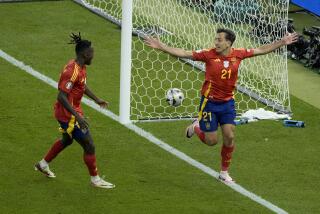A Forecast of Reign for Spain?
YOKOHAMA, Japan — The picture is worth a thousand tears, telling the sad story of 50 years of Spanish soccer exasperation in a single snapshot.
It was taken two years ago, inside Jan Breydel Stadium in Bruges, Belgium, site of the 2000 European Championship quarterfinal between Spain and France. The camera lens succeeded where Raul Gonzalez had failed, zeroing in on its target and capturing the star child of Spanish soccer after he had launched a last-minute, potential game-tying penalty kick high into the Belgian sky.
Raul, as he is simply known through Spain and his sport, is frozen in despair, standing alone, his head buried in his hands as the final seconds tick off on France’s 2-1 victory.
The ball is off somewhere in the distance, contemplating re-entry into the stratosphere.
Spain--forever supremely talented, forever extremely disappointing--had found another way to lose in a major tournament.
Two years earlier, touted as a serious challenger for the 1998 World Cup, Spain didn’t get out of the first round, losing to Nigeria and failing to score in a draw with Paraguay.
Four years before that, Spain fell in the World Cup quarterfinals on an 88th-minute goal by Italy’s Roberto Baggio.
Four years before that, Spain went out in the second round against Yugoslavia, on a goal in the 93rd minute, after hitting the post twice in regulation.
And so it has gone, for more than half a century, for Spain, which hasn’t advanced beyond the World Cup quarterfinals since 1950, when it finished fourth. Even when it played host to the event, in 1982, Spain lost to Northern Ireland in group play and was quickly ousted in the second round by West Germany.
Here we are again, at the outset of another World Cup, and a lot of people who ought to know better are touting Spain for the final four. Why? Because of La Liga, the country’s prestigious professional league and its recent run on European trophies.
Earlier this month, Raul and Real Madrid won the European Champions League--for the third time since 1998. Valencia finished runner-up in the same competition in 2000 and 2001. Alaves was a UEFA Cup finalist in 2001. Barcelona, home of Rivaldo, is one of the most famous clubs in the world.
It’s an impressive resume, yet success on the club level has never translated for Spain on the world stage. One reason: Many of the top names that populate La Liga from September to May will be trying to take out Spain in June. Rivaldo starts for Brazil, Real Madrid’s Luis Figo and Zinedine Zidane are the midfield leaders for Portugal and France, respectively. Valencia’s Pablo Aimar, Roberto Ayala and Cristian Gonzalez belong to Argentina for the next month.
But a bigger reason is the state of the Spanish team’s psyche, after so many decades of underachievement. In short, it’s shot.
Coach Jose Antonio Camacho sounds as if he’s already cushioning the floor for another fall, noting how Spain has traditionally struggled in World Cup openers against lowly regarded opponents--Spain opens this one against Slovenia--and talking about resigning if Spain is eliminated early again.
He also has set up Raul as most valuable scapegoat, telling reporters in Madrid recently, “I told Raul that while a few years ago I thought he was being given too much responsibility, now is the time for him to start pulling the cart. With Real Madrid, Raul has won just about everything there is to win, and now what’s left for him is to win with the Spanish team.”
After scoring only once in both the 1998 World Cup and the 2000 European Championship, Raul knows the pressure is on him to produce in Asia.
“It’s about time we did well,” he told World Soccer magazine. “Spain have never got the results they deserved at the World Cup. I don’t know why. Bad luck at critical moments and a lack of confidence.”
Group B, which also includes Slovenia, South Africa and Paraguay, is Spain’s to lose. Should it win the group, Spain would likely face Ireland or Cameroon in the second round, with Portugal looming in the quarterfinals. The final four is reachable, but Paraguay goalkeeper Jose Luis Chilavert, never afraid to stir the pot, predicts further calamity ahead for the Spanish.
Referring to the weak opponents Spain played during World Cup qualification, Chilavert told Paraguay radio, “It’s really easy to get through if you are playing teams like Andorra, Liechtenstein or Israel. If Spain had played in the South American qualifiers, I am sure they would not be going to the World Cup.”
On one hand, the Spaniards can shrug that off as Chilavert, who loves the sound of his voice. On the other hand, Spain lost its starting goalkeeper, Santiago Canizares, for the tournament after Canizares dropped a bottle of aftershave and severed a tendon in his foot.
Old Spice?
No. But it smells like the same old story.
(BEGIN TEXT OF INFOBOX / INFOGRAPHIC)
Spanish Lament
For all its perennial talent and its successful professional league, Spain has never finished higher than its fourth-place finish in 1950. A look at recent disappointments:
1998--A loss to Nigeria and a draw with Paraguay cost Spain a berth in the second round for the first time since 1978.
1994--The Spaniards succumb to an 88th-minute goal by Roberto Baggio in a 2-1 quarterfinal loss to Italy.
1990--After winning its group, Spain falls in overtime in the second round to Yugoslavia, 2-1.
1986--Spain’s 5-1 semifinal victory over Denmark is one of the tournament’s most stunning results, but then the Spaniards are themselves upset in the quarterfinals by Belgium on penalty kicks.
1982--Spain’s saddest showing: as tournament host, it can only tie with Honduras, loses to Northern Ireland, then finishes last in its second-round pool.







